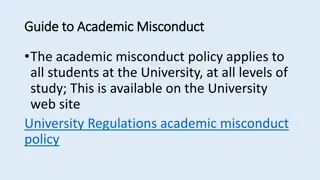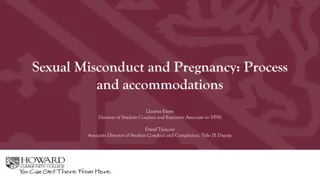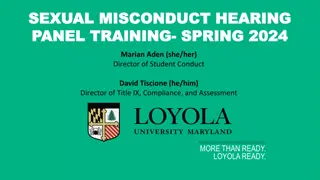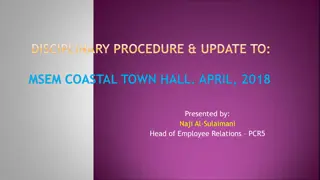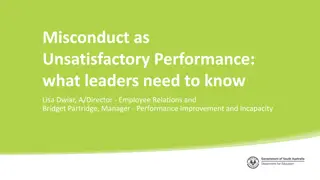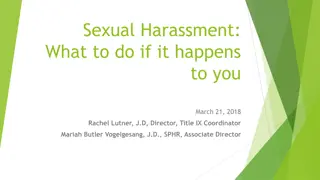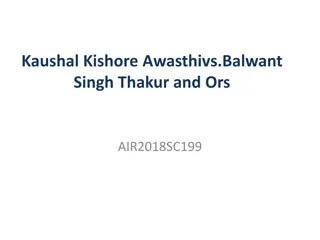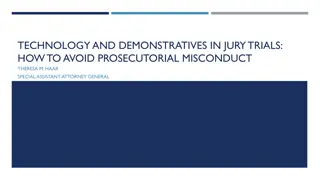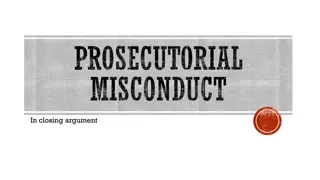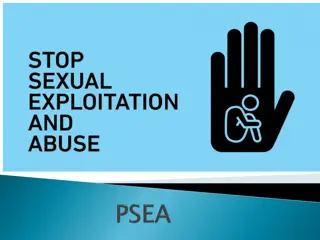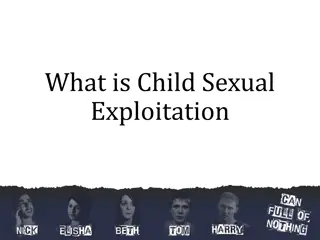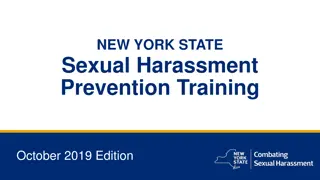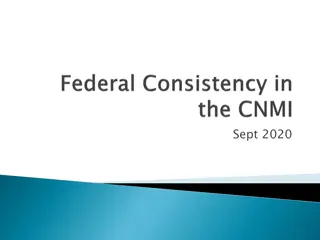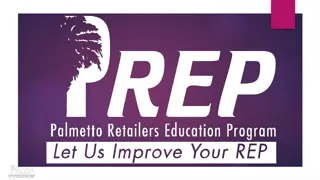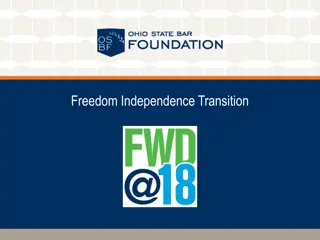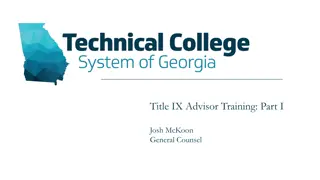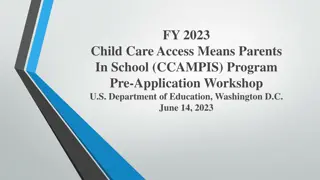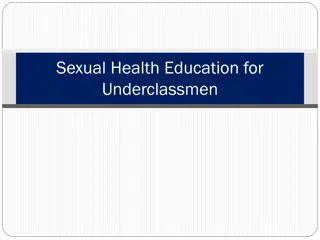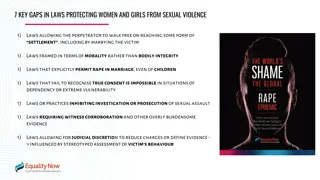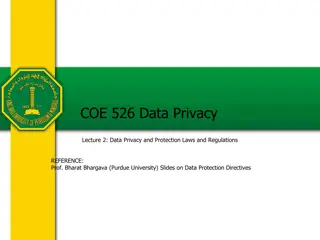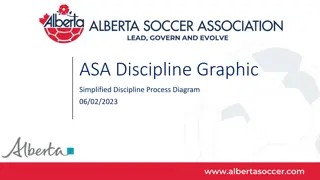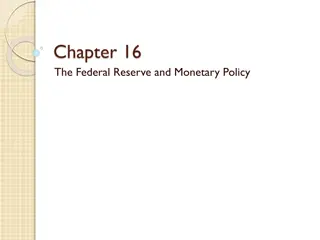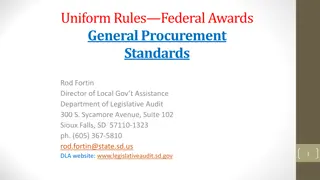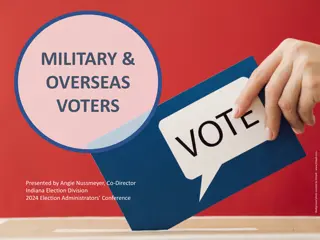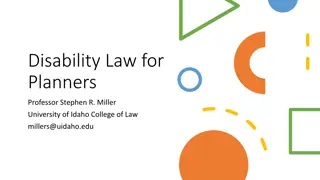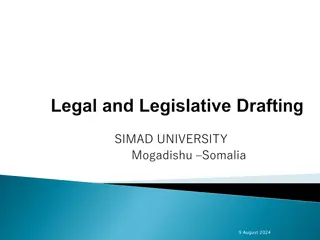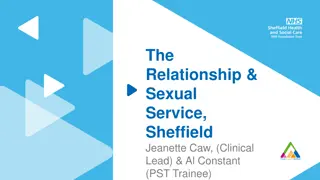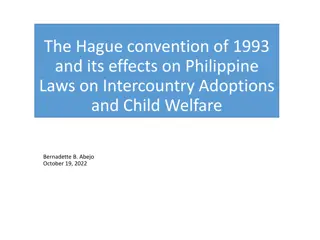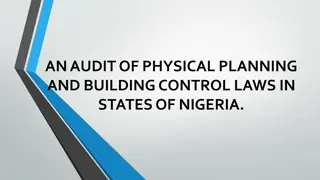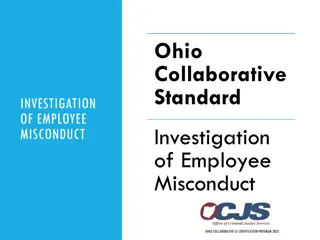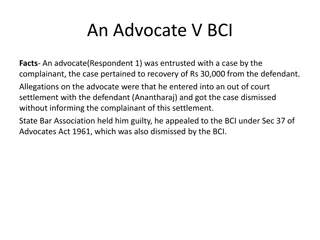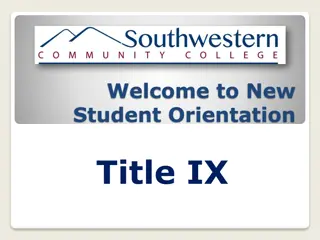Federal Sexual Misconduct Laws in Higher Education Overview
The basic structure of federal sexual misconduct laws in higher education is discussed, covering the period from 2011 to 2020. Specific guidance, regulations, and training requirements for Title IX coordinators, investigators, and decision-makers are highlighted. The importance of impartiality, avoiding bias, and conducting fair investigations is emphasized to ensure compliance with federal statutes and case law.
Download Presentation

Please find below an Image/Link to download the presentation.
The content on the website is provided AS IS for your information and personal use only. It may not be sold, licensed, or shared on other websites without obtaining consent from the author. Download presentation by click this link. If you encounter any issues during the download, it is possible that the publisher has removed the file from their server.
E N D
Presentation Transcript
TITLE IX AT MSU BRETT HARVEY, MISSISSIPPI STATE UNIVERSITY OCTOBER 2020
THE BASIC STRUCTURE OF FEDERAL SEXUAL MISCONDUCT LAWS IN HIGHER ED, 2011-2019 LESS SPECIFIC MORE SPECIFIC GUIDANCE GUIDANCE 2011 DEAR COLLEAGUE LETTER 2014 DEAR COLLEAGUE LETTER RESOLUTION AGREEMENTS STATUTES STATUTES TITLE IX (1972) CAMPUS SAVE ACT/VAWA CLERY ACT CASE LAW CASE LAW GEBSER (1998) and DAVIS (1999)
THE BASIC STRUCTURE OF FEDERAL SEXUAL MISCONDUCT LAWS IN HIGHER ED, 2020 LESS SPECIFIC MORE SPECIFIC REGULATIONS REGULATIONS 2020 DOE REGULATIONS (34 C.F.R. 106) STATUTES STATUTES TITLE IX (1972) CAMPUS SAVE ACT/VAWA CLERY ACT CASE LAW CASE LAW GEBSER (1998) and DAVIS (1999)
TRAINING REQUIREMENTS 106.45(b)(1)(iii): 106.45(b)(1)(iii): A recipient must ensure that Title IX Coordinators, investigators, decision facilitates an informal resolution process facilitates an informal resolution process, receive training on: Title IX Coordinators, investigators, decision- -makers, and any person who makers, and any person who The definition of sexual harassment in 106.30 The scope of the recipient s education program or activity How to conduct an investigation and grievance process including hearings, appeals, and informal resolution processes, as applicable, and How to serve impartially, including by avoiding prejudgment of the facts at issue, conflicts of interest, and bias. A recipient must ensure that decision decision- -makers makers receive training on: Any technology to be used at a live hearing Issues of relevance of questions and evidence, including when questions and evidence about the complainant s sexual predisposition or prior sexual behavior are not relevant, as set forth in paragraph (b)(6) of this section. A recipient also must ensure that investigators that fairly summarizes relevant evidence, as set forth in paragraph (b)(5)(vii) of this section. investigators receive training on issues of relevance to create an investigative report Any materials used to train Title IX Coordinators, investigators, decision-makers, and any person who facilitates an informal resolution process, must not rely on sex stereotypes and must promote impartial investigations and adjudications of formal complaints of sexual harassment;
TRAINING REQUIREMENTS It is essential that every participant in MSU s Title IX process It is essential that every participant in MSU s Title IX process carefully review Operating Policy 3.04 on Sexual Misconduct, as that carefully review Operating Policy 3.04 on Sexual Misconduct, as that document provides the authoritative statement of standards, policy, document provides the authoritative statement of standards, policy, and procedure. and procedure. If you have questions about the contents of the policy, please do not If you have questions about the contents of the policy, please do not hesitate to contact the Title IX Coordinator, Brett Harvey, at 662 hesitate to contact the Title IX Coordinator, Brett Harvey, at 662- -325 5839 or brett.harvey@msstate.edu. 5839 or brett.harvey@msstate.edu. 325- -
TITLE IX INVESTIGATIONS BRETT HARVEY MISSISSIPPI STATE UNIVERSITY OCTOBER 2020
TITLE IX COMPLIANCE PERSONNEL, PART 1 Title IX Coordinator: Title IX Coordinator: Coordinates [institution s] efforts to comply with [ ] responsibilities under Title IX and regulations. Must contact complainant, receive formal complaints, and authorize any investigations where the complainant does not participate. Must ensure procedural requirements for investigation/adjudication (e.g., proper notice, sufficient time) are followed. Must coordinate supportive measures. May or may not serve as investigator, oversee investigation process, and/or prepare mandatory investigative report. May not serve as adjudicator or fact-finder in hearing, or make ultimate decisions on responsibility/non-responsibility. Officials With Authority To Institute Corrective Measures (OWA s): Officials With Authority To Institute Corrective Measures (OWA s): Any official, other than the Title IX Coordinator, who has authority under your institution s policies to institute corrective measures (such as discipline, no-contact orders, or other interim measures) in response to harassment. Must relay information suggesting sexual harassment to the Title IX coordinator, as the OWA s knowledge is imputed to the institution. Investigators: Investigators: Responsible for interviewing witnesses, collecting evidence, and preparing investigation report before hearing. May or may not also function as Title IX Coordinator. May not serve as an adjudicator.
TITLE IX COMPLIANCE PERSONNEL, PART 2 Advocates: Advocates: Institutions are required to make available to the complainant and respondent an advisor at the live hearing at the live hearing. Must conduct cross-examination of the opposing party. May or may not be made available prior to hearing. (At MSU, they are.) May or may not be an attorney. Decision Decision- -Makers : recorded hearing, and for determining disciplinary sanctions. Makers : Responsible for deciding the ultimate question of responsibility or non-responsibility at a live, Must make determinations as to the permissibility of cross-examination questions, and explain rationale for excluding any question. Must make final determination, with assistance from investigation memorandum, on admissibility of evidence. Must prepare a written determination explaining result of hearing, including responsibility/non-responsibility, procedural steps in investigation, findings of fact, application of fact to institution policies, disciplinary sanctions, and appeal procedures. May be a single individual or a panel. (At MSU, normally an individual.) Must not be the same person as Title IX Coordinator or investigator. Appellate Decision Appellate Decision- -Makers Makers Must review appeals by complainants or respondents for procedural errors or new evidence that could not have previously been presented. May not be the same person as Title IX Coordinator, investigator, or original decision maker.
TITLE IX SEXUAL HARASSMENT TITLE IX SEXUAL HARASSMENT: Conduct on the basis of sex that falls within one or more of three categories: TITLE IX SEXUAL HARASSMENT: Conduct on the basis of sex that falls within one or more of three categories: Quid Pro Quo Harassment Quid Pro Quo Harassment: When an employee of HCC conditions the provision of an aid, benefit, or service of the College on an individual s participation in unwelcome sexual conduct Hostile Environment Harassment: Hostile Environment Harassment: When conduct on the basis of sex is sufficiently severe, pervasive, and objectively offensive, as determined by a reasonable person, that it effectively denies a person equal access to HCC programs or activities. Objective and Subjective Requirements: Objective and Subjective Requirements: The complainant must actually be subjectively offended AND the conduct must by judged by an objective reasonable person standard to be offensive. Severe or Pervasive: Severe or Pervasive: Another objective standard. Some actions, such as groping or direct insults or threats, may be harassment despite happening only one time, if a reasonable person could determine that one instance is pervasive enough to deny equal access. NOTE that this requirement only applies to Hostile Environment Harassment. Offenses like sexual assault and domestic violence need not meet the severe and pervasive requirement. Sexual Violence: Sexual Violence: Sexual assault, domestic violence, dating violence, or stalking, as defined by policy. MSU s MSU s Program Program or or Activity by the University, or in connection with any program or activity of the University. Sexual misconduct that does not meet this standard is nonetheless handled under the same MSU policy OP 3.04 with a few specific variations. Activity : : Sexual Harassment meets this definition if it occurs at any campus or facility operated
SEXUAL VIOLENCE Sexual Assault: Sexual Assault: Any sexual act directed against another person, forcibly and/or against that person s will (or not forcibly/against will where the victim is incapable of giving consent. Sexual conduct is considered to be against a person s will where that person has not given consent consent as defined in this policy. Sexual conduct is considered forcible where it occurs by means of physical force or coercion physical force or coercion as defined in this policy. Domestic Violence: Domestic Violence: Any felony or misdemeanor crime of violence committed by a current or former spouse or intimate partner of the victim, co-parent of a child, cohabiting person, or similarly situated person. In Mississippi, Simple Domestic Assault applies to anyone in the above groups who attempts to cause or purposely, knowingly or recklessly causes bodily injury to another; or (b) negligently causes bodily injury to another with a deadly weapon or other means likely to produce death or serious bodily harm; or (c) attempts by physical menace to put another in fear of imminent serious bodily harm. So it s pretty broad. Dating Violence: Dating Violence: Physical violence against a person who does not meet the Domestic Violence definition, but is or has been in a romantic or intimate relationship with the victim, as determined by (1) length of relationship; (2) type of relationship; and (3) frequency of interaction. Stalking: Stalking: A course of conduct (based on sex) directed at a specific person that would cause a reasonable person to fear for his or her safety, or the safety of others, or suffer substantial emotional distress.
SEXUAL MISCONDUCT Sexual Harassment Sexual Harassment is unwelcome conduct of a sexual nature that is sufficiently severe, pervasive, or persistent that it denies or limits or is likely to deny or limit a reasonable person s ability to participate in or benefit from university programs, services, opportunities or activities. Does not include First Amendment protected expression. Sexual Assault Sexual Assault refers to rape or other intentional physical sexual acts perpetrated against a person without their consent. Sexual assault includes sexual penetration or intercourse or any other physical contact of a sexual nature that occurs without consent. This includes but is not limited to deliberate physical touching as well as contact of a sexual nature with an object. Sexual assault also includes attempts to induce sexual activity via direct threats of physical violence, even where no physical contact ultimately occurs. Sexual Exploitation Sexual Exploitation refers to taking sexual advantage of another person in a way that deliberately infringes on his or her reasonable expectation of privacy and/or security, but does not involve actual or attempted physical contact. Dating/Domestic Violence Dating/Domestic Violence refers to acts of physical violence, or threats of physical violence, committed by a person who is or has been in a social relationship of a romantic or intimate nature with the victim. Stalking Stalking refers to engaging in a course of conduct (based on sex) directed at a specific person that would cause a reasonable person to fear for their safety or suffer substantial emotional distress.
CONSENT, FORCE & COERCION CONSENT CONSENT refers to words or actions that clearly show an active, knowing, and voluntary agreement to engage in a particular sexual activity. Determined objectively: Determined objectively: Would a reasonable person observing the encounter interpret words/actions as agreement? May be withdrawn May be withdrawn at any time by clear words or actions. Silence or the absence of resistance Silence or the absence of resistance by themselves are not consent. Consent with one person Consent with one person is not consent to sexual activity with another. Incapacity Incapacity prevents a person from giving effective consent, but mere impairment impairment does not. A person under the age of consent A person under the age of consent cannot give effective consent, no matter what. PHYSICAL FORCE PHYSICAL FORCE refers to physical contact with any person, by means of one s own body or an object, for the purpose of causing bodily harm or injury, or of forcibly constraining movement. Blocking exit Blocking exit is a form of physical force, even is no actual contact is made. Verbal threats of physical force Verbal threats of physical force can also preclude consent. COERCION COERCION is threatening an adverse consequence that is not physical force, but is nonetheless severe enough as to prevent a reasonable person from exercising free will in the decision whether to consent.
BASIC STEPS FOR AN INVESTIGATION SUPPORTIVE MEASURES NOTICE Institution offers complainant non-punitive support, potentially including alterations to schedules, counseling, no-contact orders. These must be offered and provided regardless of whether a formal complaint is filed, and irrespective of the outcome of any hearing. They may be temporary, or may last as long as needed. Title IX Coordinator Official with Authority learns of alleged sexual harassment HEARING A live, recorded hearing before a trained adjudicator, with direct cross- examination by advocates, at which determination of outcome is made APPEAL Review of hearing result by impartial party, either for procedural errors or newly discovered evidence INITIAL INVESTIGATION JURISDICTIONAL DECISION Determine whether matter falls within the scope of Title IX, and if not, under what procedures (if any) will it be investigated and adjudicated INVESTIGATIVE REPORT Written report by investigator(s) summarizing all relevant evidence, including evidence institution does not intend to present at hearing FORMAL COMPLAINT Initial notifications and meetings with accused party, witnesses; gathering of any documentary or other evidence Written complaint is submitted, signed by complainant or TIX Coordinator
YOUR ROLE AS AN INVESTIGATOR Your job as an investigator is to conduct an impartial investigation, collect the relevant facts whether they support guilt or innocence and summarize what you have found fairly and objectively for the Title IX Coordinator. You may not may not serve either as an advocate for a party or as an adjudicator. That would constitute a conflict of interest. You must strive to be unbiased. If you feel you have a bias for or against an individual, a group, or a general side (complainants/respondents), you must let the Title IX Coordinator know and recuse yourself. Being unbiased doesn t mean you don t draw conclusions. While the ultimate outcome is decided by an adjudicator, you may be asked to draw conclusions about relevance, credibility, and other issues in some situations for example, in helping the Coordinator prepare the Investigative Report. Your conclusions must be based on a fair and objective assessment of the evidence.
INVESTIGATION OVERVIEW Burden on Institution: The burden of proof and the burden of gathering evidence sufficient to reach a determination regarding responsibility rests on the recipient and not on the parties. (106.45(b)(5)(i)) Burden on Institution: You cannot simply ask the parties to provide all relevant evidence, as they may not know what that means. However, you generally cannot compel cooperation, which means the parties bear the responsibility of providing information that they are in the best position to know or provide. Try to ask more specific questions: Are there texts, social media messages, emails? Are there names of witnesses? People who were there shortly beforehand or shortly after? People to whom the parties described the events very shortly after they happened? Where relevant, you should independently follow up on leads e.g., locations that might have security footage if there is reason to believe it may reveal pertinent information. You are not required to be perfect, or be law enforcement, but you must make a good faith effort.
INVESTIGATION PROCEDURE Advance notice: Advance notice: Parties must be informed in writing of all meetings of any kind related to the investigation, including investigative interviews. This means date, time, location, and purpose. Notice must be sufficiently early to allow sufficient time for the party to prepare. Under new regulations, this means at least 24 hours in advance. Advisors: Advisors: Parties must be informed in writing of their right to be accompanied to all meetings by an advisor of their choice. You may not impose gag orders. You may not impose gag orders. Students and employees are free to discuss matters and seek relevant information or evidence from others. However, intimidation, threats or any other action that would deter a reasonable person from participating in an investigation is retaliation, and can be sanctioned. One obvious exception is communication between the complainant and respondent. If the institution has implemented a no-contact order, which is common, this must be followed. Parties must be permitted to view the evidence collected. Parties must be permitted to view the evidence collected. This normally occurs through the pre-hearing report, but they may also request to review it sooner via written request to the Title IX Coordinator. The general rule is, try to be as evenhanded as possible given the particular facts of the case. Basic Rule of Thumb: Basic Rule of Thumb: If you are at all in doubt, call the Title IX Coordinator.
INVESTIGATION TIPS The default order for investigation usually looks something like: Receive formal complaint and provide written notices. Interview complainant. Interview respondent. Based on initial interviews (1) gather any documentary evidence; (2) identify and schedule interviews of potential witnesses. Interview potential witnesses. After reviewing documentary evidence and witness interviews, re-interview complainant and then respondent. This interview should focus on identifying any inconsistencies or potential weaknesses and giving parties an opportunity to address them. The timeline for investigation and adjudication is now reasonably prompt , which provides some flexibility. But a good rule of thumb is no more than 45 days from the initial interview to sitting down to the initial draft of the investigation report. Where possible, interviews should either change their stories, and you need to be able to verify what was said. There may be some exceptions, such as follow-up interviews to clear up minor details. either be witnessed by an additional institution employee or or be recorded. Parties do Strong note-taking is important. Notes should be accurate and fair. Pause the interview as needed to make sure you are getting all relevant information. Be transparent with the parties. In some cases, an investigator may need to convey the opposing party s strongest position will be, and give the interviewee an opportunity to respond. This will help you uncover red herring issues and focus on the points and evidence that matter.
INVESTIGATION TIPS As an investigator, your role is neither prosecutor nor defense counsel. You are an objective and impartial fact- gatherer. Personal experiences, biases, or empathy cannot change the way you approach an investigation. It is possible to balance compassion and investigative rigor. During initial interviews, the best approach is to allow each party to tell their story in the manner they see fit, then to follow up with specific questions to fill in details. Interviews generally should not be games of gotcha, in which investigators try to catch parties in contradictions. If a statement seems inconsistent or contradicted by evidence, the best practice is to tell the interviewee your concern and give them an opportunity to provide an explanation. If a story doesn t hold together, that will become clear in time without the need for aggressive interrogation. Understand that both parties likely are under great stress. Provide ample time for them to answer, and understand that brief confusion or lack of recollection is not, in itself, evidence of fabrication. However, the mere fact that a party cannot recall information or has trouble recounting events should not be viewed as evidence of trauma suggesting that sexual violence occurred.
TITLE IX ADVISING BRETT HARVEY MISSISSIPPI STATE UNIVERSITY OCTOBER 2020
THE ADVISORS ROLE At MSU, an appointed advisor s role is to advise the party complainant or respondent on issues related to MSU policy and procedure, as well as assisting the party in identifying potentially relevant evidence or issues and presenting them to the investigator or adjudicator. An advisor may be present for any meeting, interview, or hearing in MSU s process, at the discretion of the party. It is the responsibility of the party to ensure their advisor s availability. And advisor may raise procedural questions or objections at any point to the Title IX Coordinator. The ultimate responsibility for presenting arguments and positions lies with the party; the advisor s role is to suggest possible alternatives, but they have neither the power nor the responsibility to compel a party to take any particular approach. An advisor s communications with a party are confidential with respect to MSU s process, but MSU cannot guarantee that communications will be privileged against external discovery. An advisor is not expected to be impartial their duty is to advocate for the party they are assigned to. However, the advisor is expected to behave professionally at all times and to adhere to all rules and procedures outlined in OP 3.04.
ADVISING CONSIDERATIONS Taking inventory of relevant evidence. Texts, emails, social media messages, possible security camera footage or card swipes. Taking inventory of potential witnesses. Witnesses to the actual event, individuals present shortly before or after the event, witnesses to admissions by the opposing party. Preparing the party to state their position clearly to investigators. Considering possible informal resolution. This is never required, but parties may wish to explore it as an option. Considering the ramifications of possible parallel criminal or civil proceedings. When to consider admission of responsibility or voluntary withdrawal of complaint.
HEARING ADVISORS In many instances, this portion of advising will be handled by a different individual than the initial investigation. The hearing advisor should therefore coordinate with the investigation advisor to be sure all relevant information about the case is communicated. The hearing advisor is responsible for cross-examination of opposing parties and witnesses at the hearing and should prepare accordingly. The hearing advisor also may raise procedural issues or objections at the hearing. The advisor does not present testimony. Generally, it is the duty of the party to speak on factual issues, although the adjudicator does have discretion to consider explanations from the advisor when he or she determines they may be helpful. The hearing advisor will assist a party receiving an adverse outcome in any internal appeal process.
TITLE IX ADJUDICATION BRETT HARVEY MISSISSIPPI STATE UNIVERSITY OCTOBER 2020
THE ADJUDICATORS ROLE The adjudicator oversees the live hearing and renders the university s decision as to responsibility or non-responsibility. The adjudicator is assisted by the Title IX Coordinator, who may offer opinions and advice on procedural questions or explanations of the contents of the Investigation Report, but may not offer opinions on the ultimate merits of the matter. The adjudicator may not serve as an investigator or advocate, and may not serve as an appellate adjudicator in the same matter he or she heard in the first instance. The investigator must be impartial and fair, and weigh all relevant evidence, both inculpatory and exculpatory. If an investigator has a bias toward any individual, group, or type of party (e.g., complainants or respondents) they must disclose this immediately and recuse. The adjudicator has discretion to conduct the live hearing as he or she deems fit, but must provide both parties equal and fair opportunity to present relevant evidence. Finally, the adjudicator is responsible for writing an opinion explaining the basis for the outcome of the hearing.
THE INVESTIGATIVE REPORT The investigative report is prepared by the Title IX Coordinator in conjunction with the investigator. The investigative report is prepared by the Title IX Coordinator in conjunction with the investigator. It summarizes all relevant evidence, both inculpatory and exculpatory, and is provided to the It summarizes all relevant evidence, both inculpatory and exculpatory, and is provided to the parties and the adjudicator(s). parties and the adjudicator(s). What is relevant evidence ? What is relevant evidence ? Federal regulations say the word relevant should be defined consistent with its ordinary meaning. (p. 811, n.1018) This does not permit exclusion based on other factors like undue prejudice or cumulative evidence, which would be consider by a court evaluating whether to admit evidence. Does this evidence make any fact material to the ultimate outcome more or less likely to be true? ultimate outcome more or less likely to be true? If so, it should be included in the investigative report, even if the report ultimately suggests that its impact on the ultimate decision is low. The simplest approach may be to ask: Does this evidence make any fact material to the The report may or may not include recommended findings or conclusions, but the decision-maker is obliged to make an independent, objective determination based on relevant evidence.
THE LIVE HEARING Regulations require a live hearing . Regulations require a live hearing . At this hearing, the decision-maker(s) must permit each party s advisor to ask the other party and any witnesses all relevant questions and follow-up questions, including those challenging credibility. (106.46(b)(6)) Direct Cross Direct Cross- -Examination: Examination: Cross-examination must be conducted directly, orally, and in real time by the party s advisor of choice and never by a party personally. Remote Option: Remote Option: At the request of either party, the request of either party, the recipient must provide for the live hearing to occur with the parties located in separate rooms with technology enabling the decision-maker(s) and parties to simultaneously see and hear the party or the witness answering questions. Must be recorded, either audiovisual or audio, or transcribed. Advisors Required: Advisors Required: If a party does not have an advisor present at the live hearing, the recipient must provide without charge or fee to that party, an advisor of the recipient s choice, who may be but is not required to be an attorney, to conduct cross-examination on behalf of that party. The advocate who assists the party at the hearing often will not be the same person who assisted them in the initial investigation. MSU will facilitate a hand-off of the matter from the investigation advisor to the hearing advisor. These two individuals should cooperate to the greatest extent possible to ensure the party receives sufficient advising and advocacy.
THE LIVE HEARING The order of the hearing is flexible, but typically runs as follows: The order of the hearing is flexible, but typically runs as follows: Reading of the charge and respondent s plea Parties opening statements Complainant s Testimony and Cross Respondent s Testimony and Cross Witness Testimony and Cross Any further questions from Adjudicator Parties closing statements Recess for determination of responsibility/non-responsibility Announcement of determination If responsible, parties statements on sanction Adjourn to determine sanction and prepare Written Determination.
RELEVANCE OF QUESTIONS AND EVIDENCE Questions: Questions: Only relevant cross-examination and other questions may be asked of a party or witness. (106.45(b)(6)(i)) Before a complainant, respondent, or witness answers a cross-examination or other question, the decision-maker(s) must first determine whether the question is relevant and explain any decision to exclude a question as not relevant. We suggest the following approach: (1) The question is asked; (2) the decision maker considers it; (3) the decision maker tells the witness they may or may not respond; and (4) if not, the decision maker briefly explains the rationale for excluding the question. Rape Shield Provision: Rape Shield Provision: Questions and evidence about the complainant s sexual predisposition or prior sexual behavior are not relevant, unless such questions and evidence about the complainant s prior sexual behavior are offered to prove that someone other than the respondent committed the conduct alleged by the complainant, or if the questions and evidence concern specific incidents of the complainant s prior sexual behavior with the respect to the respondent and are offered to prove consent. Evidence: Evidence: While the investigation report can make recommendations as to the relevance of evidence (including exhibits and witnesses) the regulations strongly suggest that he decision maker must make final determinations as to what evidence is admissible. The simplest approach may be to ask: Does this evidence make any fact material to the ultimate outcome more or less likely to be true? An adjudicator may admit evidence but assign it little or no weight in a determination. These real-time decisions are another reason why individual adjudicators, as opposed to panels, may be preferable.
LIVE TESTIMONY REQUIRED If a party or witness does not submit to cross-examination at the live hearing, the decision maker must not rely on any statement of that party or witness in reaching a determination regarding responsibility; provided, however, that the decision maker cannot draw an inference about the determination regarding responsibility based solely on the party s or witness s absence from the live hearing or refusal to answer cross- examination or other questions. (106.45(b)(6)) DOE has repeatedly confirms that this allows parties to keep out any factual statement, including a direct recorded confession by refusing to testify. At MSU, a refusal to testify or answer ANY relevant question should result in the entirety of the party or witness s statement(s) including any prior hearing testimony being disregarded, and the matter being decided based on any remaining evidence. Documents such as police reports likely will need live witnesses to authenticate them.
WRITTEN DETERMINATION The adjudicator s written determination must include: The adjudicator s written determination must include: A statement of the allegations considered A statement of the allegations considered A descriptions of the procedural steps from the receipt of the formal complaint (which will be provided in the A descriptions of the procedural steps from the receipt of the formal complaint (which will be provided in the Investigative Report) Investigative Report) Findings of relevant fact Findings of relevant fact Conclusions applying relevant MSU policies to facts Conclusions applying relevant MSU policies to facts A statement of the result for each separate allegation, including any sanction or other remedy and the rational for A statement of the result for each separate allegation, including any sanction or other remedy and the rational for the same, and the same, and A statement of possible grounds and procedures for appeal. A statement of possible grounds and procedures for appeal.
APPEALS An appeal may be made by any party from (1) any pre An appeal may be made by any party from (1) any pre- -hearing dismissal; or (2) the outcome of a hearing. hearing dismissal; or (2) the outcome of a hearing. A party may appeal by submitting a written notice of appeal to the Title IX Coordinator within seven days of any A party may appeal by submitting a written notice of appeal to the Title IX Coordinator within seven days of any decision. decision. The Title IX Coordinator will inform parties of how to submit written statements on appeal. The Title IX Coordinator will inform parties of how to submit written statements on appeal. The appellate adjudicator will consider ONLY the hearing record, the parties written statements, and applicable The appellate adjudicator will consider ONLY the hearing record, the parties written statements, and applicable policies. He or she may not conduct a new hearing or hear new testimony. policies. He or she may not conduct a new hearing or hear new testimony. The appellate adjudicator may (1) affirm the outcome; (2) reverse the outcome and remand to the hearing The appellate adjudicator may (1) affirm the outcome; (2) reverse the outcome and remand to the hearing adjudicator for further proceedings to determine remaining questions; or (3) if the case leaves no remaining adjudicator for further proceedings to determine remaining questions; or (3) if the case leaves no remaining material questions, reverse the outcome and render a new, final outcome. material questions, reverse the outcome and render a new, final outcome. The appellate adjudicator may not have served in any other capacity in connection with the investigation in The appellate adjudicator may not have served in any other capacity in connection with the investigation in question. question. The decision of the appellate adjudicator is final. The decision of the appellate adjudicator is final.


